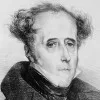That Greek one then is my hero, who watched the bath water
rise above his navel and rushed out naked. “I found it,
I found it” into the street in all his shining, and forgot
that others would only stare at his genitals. What laughter!Daniel "Dannie" Abse (1923-2014) Welsh poet
Poem (1952), “Letter to Alex Comfort,” Walking Under Water
(Source)
Referring to Archimedes.
Quotations about:
epiphany
Note not all quotations have been tagged, so Search may find additional quotes on this topic.
When he left the bishop’s dwelling Jean Valjean, as we know, had been in a state of mind unlike anything he had ever experienced before and was quite unable to account for what was taking place within him. He had sought to harden his heart against the old man’s saintly act and moving words. “You have promised me to become an honest man. I am buying your soul. I am rescuing it from the spirit of perversity and giving it to God.” The words constantly returned to him and he sought to suppress them with arrogance, which in all of us is the stronghold of evil. Obscurely he perceived that the priest’s forgiveness was the most formidable assault he had ever sustained; that if he resisted it his heart would be hardened once and for all, and that if he yielded he must renounce the hatred which the acts of men had implanted in him during so many years, and to which he clung. He saw dimly that this time he must either conquer or be conquered, and that the battle was now joined, a momentous and decisive battle between the evil in himself and the goodness in that other man.
[Quand Jean Valjean était sorti de chez l’évêque, on l’a vu, il était hors de tout ce qui avait été sa pensée jusque-là. Il ne pouvait se rendre compte de ce qui se passait en lui. Il se roidissait contre l’action angélique et contre les douces paroles du vieillard. « Vous m’avez promis de devenir honnête homme. Je vous achète votre âme. Je la retire à l’esprit de perversité et je la donne au bon Dieu. » Cela lui revenait sans cesse. Il opposait à cette indulgence céleste l’orgueil, qui est en nous comme la forteresse du mal. Il sentait indistinctement que le pardon de ce prêtre était le plus grand assaut et la plus formidable attaque dont il eût encore été ébranlé ; que son endurcissement serait définitif s’il résistait à cette clémence ; que, s’il cédait, il faudrait renoncer à cette haine dont les actions des autres hommes avaient rempli son âme pendant tant d’années, et qui lui plaisait ; que cette fois il fallait vaincre ou être vaincu, et que la lutte, une lutte colossale et définitive, était engagée entre sa méchanceté à lui et la bonté de cet homme.]
Victor Hugo (1802-1885) French writer
Les Misérables, Part 1 “Fantine,” Book 2 “The Fall,” ch. 13 (1.2.13) (1862) [tr. Denny (1976)]
(Source)
(Source (French)). Alternate translations:When Jean Valjean left the bishop's house, as we have seen, his mood was one that he had never known before. He could understand nothing of what was passing within him. He set himself stubbornly in opposition to the angelic deeds and the gentle words of the old man, “you have promised me to become an honest man. I am purchasing your soul, I withdraw it from the spirit of perversity, and I give it to God Almighty." This came back to him incessantly. To this celestial tenderness, he opposed pride, which is the fortress of evil in man. He felt dimly that the pardon of this priest was the hardest assault, and the most formidable attack which he had yet sustained ; that his hardness of heart would be complete, if it resisted this kindness; that if he yielded, be must renounce that hatred with which the acts of other men had for so many years filled his soul, and in which he found satisfaction; that, this time, he must conquer or be conquered, and that the struggle, a gigantic and decisive struggle, had begun between his own wickedness, and the goodness of this man.
[tr. Wilbour (1862)]When Jean Valjean quitted the bishop’s house, he was lifted out of his former thoughts, and could not account for what was going on within him. He stiffened himself against the angelic deeds and gentle words of the old man: “You have promised me to become an honest man. I purchase your soul; I withdraw it from the spirit of perverseness, and give it to God.” This incessantly recurred to him, and he opposed to this celestial indulgence that pride which is within us as the fortress of evil. He felt instinctively that this priest’s forgiveness was the greatest and most formidable assault by which he had yet been shaken; that his hardening would be permanent if he resisted this clemency; that if he yielded he must renounce that hatred with which the actions of other men had filled his soul during so many years, and which pleased him; that this time he must either conquer or be vanquished, and that the struggle, a colossal and final struggle, had begun between his wickedness and that man’s goodness.
[tr. Wraxall (1862)]When Jean Valjean left the Bishop's house, he was, as we have seen, quite thrown out of everything that had been his thought hitherto. He could not yield to the evidence of what was going on within him. He hardened himself against the angelic action and the gentle words of the old man. "You have promised me to become an honest man. I buy your soul. I take it away from the spirit of perversity; I give it to the good God."
This recurred to his mind unceasingly. To this celestial kindness he opposed pride, which is the fortress of evil within us. He was indistinctly conscious that the pardon of this priest was the greatest assault and the most formidable attack which had moved him yet; that his obduracy was finally settled if he resisted this clemency; that if he yielded, he should be obliged to renounce that hatred with which the actions of other men had filled his soul through so many years, and which pleased him; that this time it was necessary to conquer or to be conquered; and that a struggle, a colossal and final struggle, had been begun between his viciousness and the goodness of that man.
[tr. Hapgood (1887)]When Jean Valjean left the bishop's house, as we saw, his thoughts were unlike any he had ever known before. He could understand nothing of what was going on inside him. He stubbornly resisted the angelic deeds and the gentle words of the old man, "You have promised me to become an honest man. I am purchasing your soul. I withdraw it from the spirit of perdition, and I give it to God!" This kept coming back to him. In opposition to this celestial tenderness, he summoned up pride, the fortress of evil in man. He dimly felt that this priest's pardon was the hardest assault, the most formidable attack he had ever sustained; that his hardness of heart would be complete, if it resisted this kindness; that if he yielded, he would have to renounce the hatred with which the acts of other men had for so many years filled his soul, and in which he found satisfaction; that, this time, he must conquer or be conquered, and that the struggle, a gigantic and decisive struggle, had begun between his own wrongs and the goodness of this man.
[tr. Wilbour/Fahnestock/MacAfee (1987)]When jean Valjean left the bishop's house he was, as we have seen, in what was to him an entirely different mental universe. He could not undersdtand what was going on inside him. He hardened himself against the old man's angelic deed and gentle words. "You promised to become an honest man. I'm buying your soul. I'm redeeming it from the spirit of iniquity and giving it to the good Lord." This kept coming back to him. This heavenly kindness he countered with pride -- the fortress of evil, as it were, within us. He had the indistinct feeling that this priest's forgiveness was the greatest assault and most tremendous attack he had ever experience. That if he resisted this clemency the hardening of his heart would be definitive. That if he yielded he would be obliged to renounce that hatred with which the deeds of other men had filled his soul over so many years, a hatred he relished. That this time he had to vanquish or be vanquished, and that the battle had been joined, a colossal and decisive battle, between his own wickedness and that man's goodness.
[tr. Donougher (2013)]
There are very few human beings who receive the truth, complete and staggering, by instant illumination. Most of them acquire it fragment by fragment, on a small scale, by successive developments, cellularly, like a laborious mosaic.
It’s that moment, that brief epiphany when the universe opens up and shows us something, and in that instant we get just a sense of an order greater than Heaven and, as yet at least, beyond the grasp of Stephen Hawking. It doesn’t require worship, but, I think, rewards intelligence, observation and enquiring minds. I don’t think I’ve found God, but I may have seen where gods come from.
Terry Pratchett (1948-2015) English author
“I create gods all the time — now I think one might exist,” Daily Mail (21 Jun 2008)
(Source)
How many a man has dated a new era in his life from the reading of a book.
Henry David Thoreau (1817-1862) American philosopher and writer
Walden, ch. 1 “Reading” (1854)
(Source)
Those who are destitute of philosophy may be compared to prisoners in a cave, who are only able to look in one direction because they are bound, and who have a fire behind them and a wall in front. Between them and the wall there is nothing; all that they see are shadows of themselves, and of objects behind them, cast on the wall by the light of the fire. Inevitably they regard these shadows as real, and have no notion of the objects to which they are due. At last, some man succeeds in escaping from the cave to the light of the sun; for the first time he sees real things, and becomes aware that he had hitherto been deceived by shadows. If he is the sort of philosopher who is fit to become a guardian, he will feel it is his duty to those who were formerly his fellow prisoners to go down again into the cave, instruct them as to the truth, and show them the way up. But he will have difficulty in persuading them, because, coming out of the sunlight, he will see shadows less clearly than they do, and will seem to them stupider than before his escape.
What is the meaning of life? That was all — a simple question; one that tended to close in on one with years. The great revelation had never come. The great revelation perhaps never did come. Instead there were little daily miracles, illuminations, matches struck unexpectedly in the dark; here was one. This, that, and the other….
As soon as a true thought has entered our mind, it gives a light which makes us see a crowd of other objects which we have never perceived before.
[Aussitôt qu’une pensée vraie est entrée dans notre esprit, elle jette une lumière qui nous fait voir une foule d’autres objets que nous n’apercevions pas auparavant.]
François-René de Chateaubriand (1768-1848) French writer, politican, diplomat
“Pensées, Réflexions et Maximes,” Complete Works of Chateaubriand [Oeuvres Illustrées de Chateaubriand], Vol. 3, sec. 7 (1852)
(Source)
When we are convinced of some great truths, and feel our convictions keenly, we must not fear to express it, although others have said it before us. Every thought is new when an author expresses it in a manner peculiar to himself.
An idea that is not dangerous is unworthy of being called an idea at all.
Oscar Wilde (1854-1900) Irish poet, wit, dramatist
“The Critic as Artist,” Part 2 [Gilbert], Intentions (1891)
(Source)
It often happens that things come into the mind in a more finished form than could have been achieved after much study.
[Il arrive souvent que des choses se présentent plus achevées à notre esprit qu’il ne les pourrait faire avec beaucoup d’art.]François VI, duc de La Rochefoucauld (1613-1680) French epigrammatist, memoirist, noble
Réflexions ou sentences et maximes morales [Reflections; or Sentences and Moral Maxims], ¶101 (1665-1678) [tr. Tancock (1959)]
(Source)
Present in the 1st (1665) edition, where variants included the phrase:There are pretty things that the mind does not seek, and that it finds all completed in itself; it seems that they are hidden there, like gold and diamonds in the bosom of the earth.
[Il y a des jolies choses que l’esprit ne cherche point, et qu’il trouve toutes achevées en lui-même; il semble qu’elles y soient cachées, comme l’or et les diamants dans le sein de la terre.]
(Source (French)). Alternate translations:There are certain ingenious things which the mind seeks not after, but finds brought to their full perfection in it self; so that it should seem they lay hid there, as Gold and Diamonds do in the bosom of the earth.
[tr. Davies (1669), ¶190]It often happens, that some things offer themselves to our Wit, and are finer description in the very first thought, than it is possible for a man to make them by the Additions of Art and Study.
[tr. Stanhope (1694), ¶102]It often happens, that some Things offer themselves finer in the very first Thought, than it were possible for a Man to have made them by Art and Study.
[pub. Donaldson (1783)]It often happens, that things present themselves to the mind; more finished, than we, with much labour, can make them.
[ed. Gowens (1851), ¶391]It often happens; that things present themselves to our minds in a more complete state than we could by much art make them arrive at.
[tr. Bund/Friswell (1871), ¶104]Ideas often flash across our minds more complete than we could make them after much labour.
[tr. Heard (1917), ¶101]It often happens that ideas reach our mind in a state of perfection exceeding that which our intellect, with all the resources of art, could fashion.
[tr. FitzGibbon (1957), ¶101]Things often spring spontaneously to mind in a more finished form than could be achieved with great labor and thought.
[tr. Kronenberger (1959), ¶101]
LONDO: There comes a time when you look into the mirror, and you realize that what you see is all that you will ever be. Then you accept it, or you kill yourself. Or you stop looking into mirrors.














